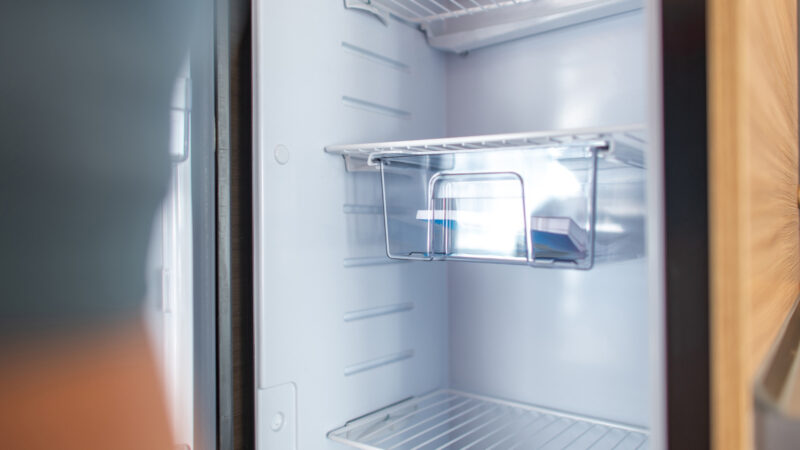Table of Contents Show
A residential RV refrigerator has many pros and cons. But, if you just had an RV technician tell you that your RV absorption fridge has died, you might consider one.
For some families, the 8-cubic-foot two-way fridge just isn’t enough space to enjoy meals for a week.
So, if you’re considering upgrading to a residential RV refrigerator, you’ll want to know both the advantages and disadvantages before deciding.
Purchasing an RV fridge is costly. You don’t want to waste your time or money. Let’s dive in!
What Is a Residential RV Refrigerator?
You may find several different types of RV refrigerators. One of those is a residential-style fridge. This is when you install a normal fridge you find in any home in your RV.
This type of appliance also needs a constant supply of power. A compressor keeps the items cold and uses AC power to operate. So what’s the difference?
How Is a Residential RV Refrigerator Different from Other RV Refrigerators?
What makes a residential RV refrigerator different from others is the power source. As mentioned above, these residential-style fridges use AC power because they operate just like the fridge you have in your kitchen at home.
Other RV refrigerators may run on propane at least some of the time.
But power from a pedestal at a campground, a generator, or a battery bank with an inverter will supply the power necessary to run a residential refrigerator.
It uses a lot of energy, which isn’t ideal for boondocking. Most people who like to dry camp prefer a two-way fridge, which uses propane and electricity.
These two-way RV refrigerators use AC power or propane. It’s up to the owner and the situation as to which is best.
You may also get a three-way RV refrigerator, which can run on AC power, DC power, or propane. Again, this is useful for boondockers because they can use propane rather than the house batteries.
How Much Does a Residential RV Refrigerator Cost?
A 14 cubic-foot built-in four-door refrigerator by Furrion with a wine cellar will cost over $2,000. Another option by Furrion, a 16 cubic foot 12V side-by-side residential style refrigerator, will cost over $2,200.
Compared to a smaller 6 cubic-foot absorption refrigerator by Dometic, it’s not much different. This option costs over $2,200. A four-door 13 cubic-foot absorption refrigerator by Dometic costs about $6,000.
So you won’t necessarily have to spend more for a residential refrigerator than an RV one.
Can You Install an Aftermarket Residential RV Refrigerator?
If your RV didn’t come with a residential RV refrigerator, you can install one aftermarket.
Whether you want more storage space for food and drinks or a more consistent cooling temperature, you can find a residential fridge to suit your desires.
Or maybe your absorption fridge is on its last leg, and instead of spending $6,000 to replace it, you want to go a cheaper route and only pay $2,000.
However, this is not a simple project. Most people turn to professional help when installing an aftermarket residential refrigerator. You need serious handyman skills in cabinetmaking and wiring to get the job done.
But hooking up the fridge and getting it working isn’t the only problem. Finding a way to get this huge fridge inside your RV is one of the biggest challenges.
5 Pros of a Residential RV Refrigerator
Residential refrigerators have some advantages over their two and three-way counterparts.
You’ll want to consider these when deciding if a residential fridge is right for you.
1. More Room for Food
Full-time travelers need lots of room for food. Sometimes they’re 45 minutes or more away from a grocery store, so stocking up on supplies to last for a week or two is important.
Most two and three-way RV refrigerators are smaller than residential ones. A family can have plenty of storage for food and drinks with a residential-sized fridge.
2. Consistent Cold Temperatures
Absorption RV fridges like two and three-way units don’t have a consistent temperature. A residential RV refrigerator does a much better job maintaining cold temperatures, so food doesn’t spoil.
Plus, the ambient temperature outside doesn’t affect the cooling. You can even keep ice cream frozen!
3. Cools Down Faster
Because a residential refrigerator uses a compressor, it cools down much faster than absorption fridges. Most campers have to turn on their two or three-way RV fridges at least 24 hours in advance for them to cool to a safe food temperature.
Keep in Mind: Are you having problems with your Dometic RV fridge? Let’s take a look at how you can troubleshoot them!
4. Less Maintenance
An RV refrigerator requires frequent defrosting to help it cool properly since these units use absorption technology.
Occasionally, you have to clean out the fan for adequate airflow as well. But residential RV refrigerators don’t require this much care. If you keep them powered and clean, they’ll operate without any other necessary maintenance.
5. More Energy Efficient
When running a residential refrigerator on a battery bank, the inverter must constantly run to convert the energy from DC to AC power. So this situation isn’t ideal for a residential fridge.
But when connected to shore power, a residential RV refrigerator will consume less power than a standard RV one. So for campers who like staying in campgrounds, it’s more energy efficient than its counterparts.
5 Cons of a Residential RV Refrigerator
On the other hand, residential RV refrigerators aren’t perfect. They aren’t even ideal for some types of campers. Let’s take a look at a handful of disadvantages.
1. Can’t Run on Propane
If you lose power, a residential RV fridge has no alternative power source. A residential option won’t use propane as a backup source.
And as such, it makes it more difficult if it needs repair. You’ll need to either remove it from your RV or ask the repair shop to hook up your rig to a power source for diagnostics.
And, when dry camping, you’ll need a huge battery bank to keep the fridge operating.
2. Boondocking Requires More Power
This leads to the second con: you’ll need to spend a lot of money increasing your battery bank and solar panels to run a residential RV refrigerator while boondocking.
Since it can’t run on propane, it’ll require a lot of energy from the house batteries. Many boondockers prefer a propane fridge because of this disadvantage.

3. Takes Up More Interior Space
The size of a residential refrigerator is an advantage and disadvantage. You can certainly store more food, and that’s helpful for families or full-time travelers. But that means it also takes up more interior space.
The kitchen may seem smaller because this giant appliance uses half the space. A smaller two or three-way fridge is a better option for campers who want more countertop space.
4. Installation Is More Difficult
If you want an aftermarket residential RV fridge, installation may be difficult. For many motorhome owners, getting this size fridge into the RV may require removing the windshield.
Other RV owners may have to remove an entire slide to get the refrigerator into the kitchen. A smaller fridge can fit through most entry doors, but that’s not the case with a residential RV fridge.
Keep in Mind: Which RV Fridge Is the Best? Let’s dive in!
5. Not as Travel-Friendly
Finally, a residential RV fridge is meant to be installed in a house. It’s not designed for an RV. The jostling around of RV travel might cause problems down the road.
If you’re stationary, this might not be too much of a concern. But if you travel frequently, it’s important to note that these may experience more damage and wear and tear.
Should You Switch to a Residential RV Refrigerator?
So should you switch to a residential RV refrigerator? If you like to dry camp often, probably not. The amount of power these fridges use can drain your batteries.
If you have poured tens of thousands of dollars into a huge solar setup, then you can probably enjoy the advantages of a residential refrigerator.
A residential RV fridge may be a great solution if you enjoy week-long family camping trips to the beach a few times a year. It offers plenty of storage and cools consistently.
If you don’t move weekly or monthly, it may not cause too much damage. So only you can answer this question based on how you travel.
Is a residential RV refrigerator right for you?






